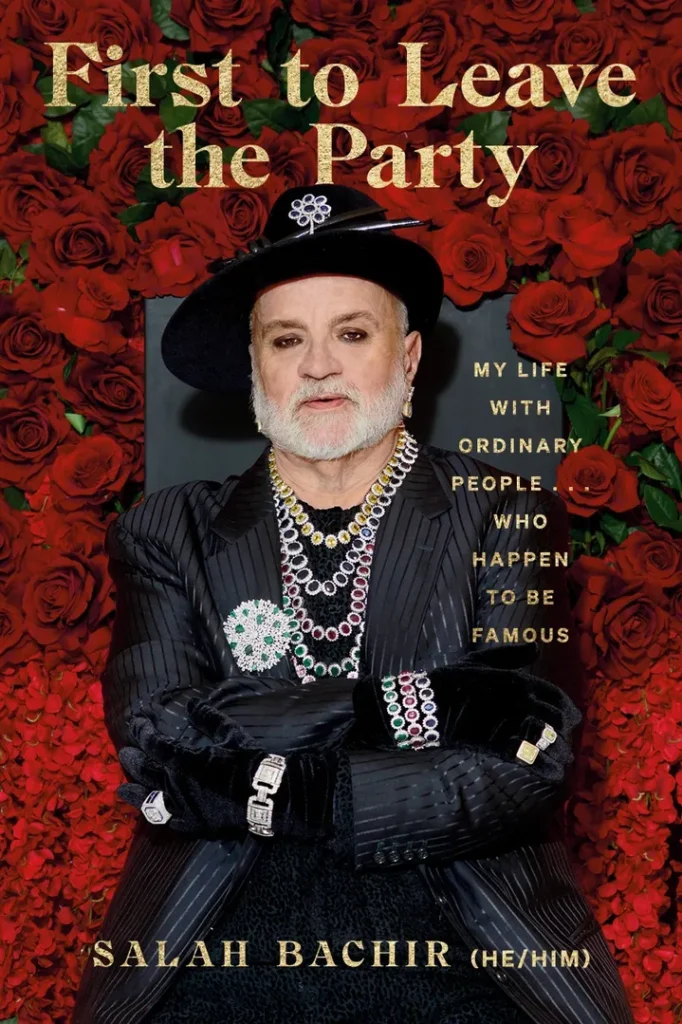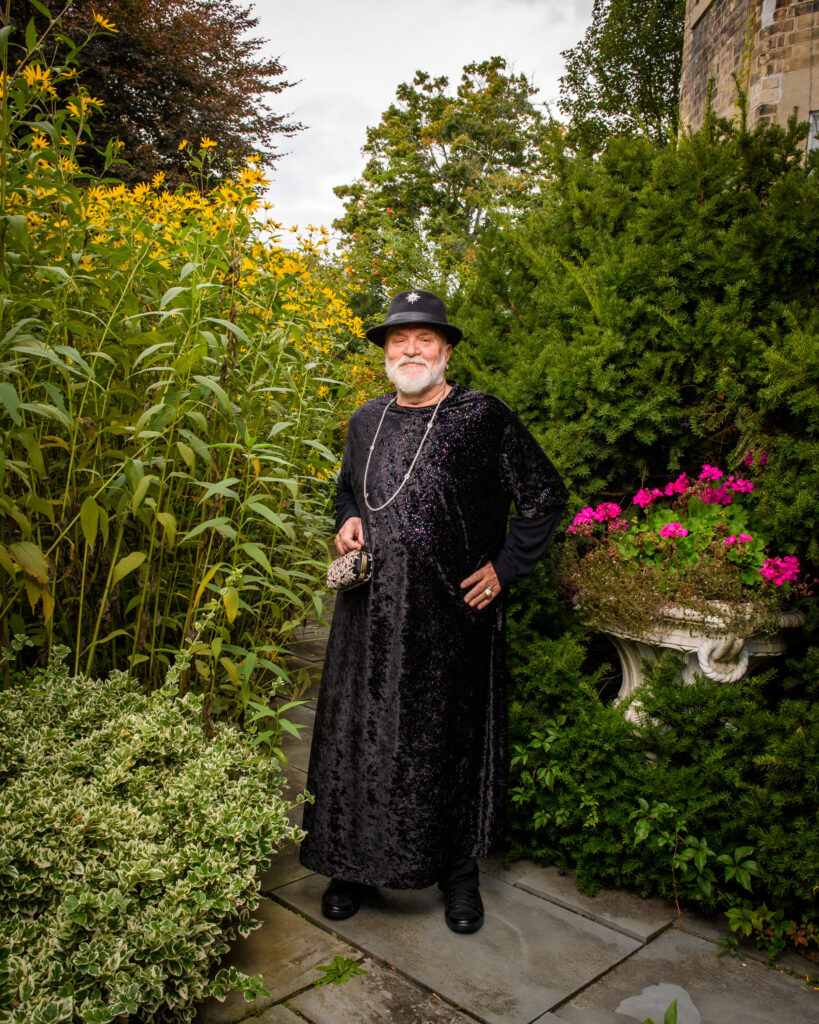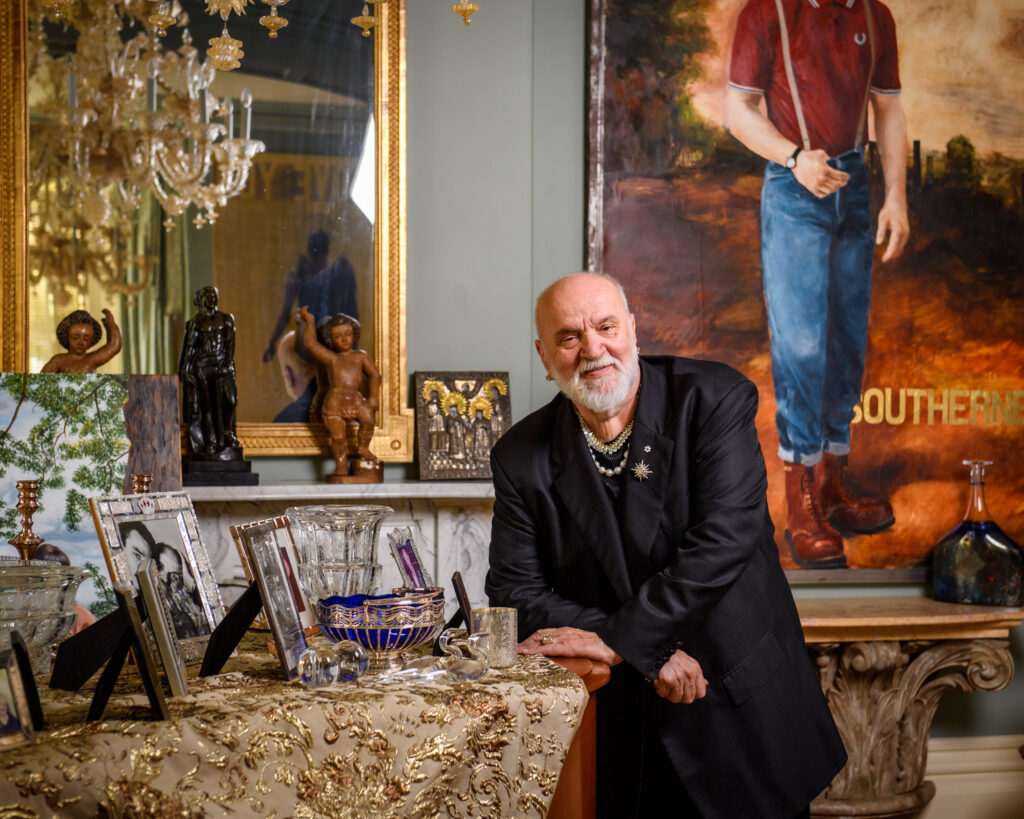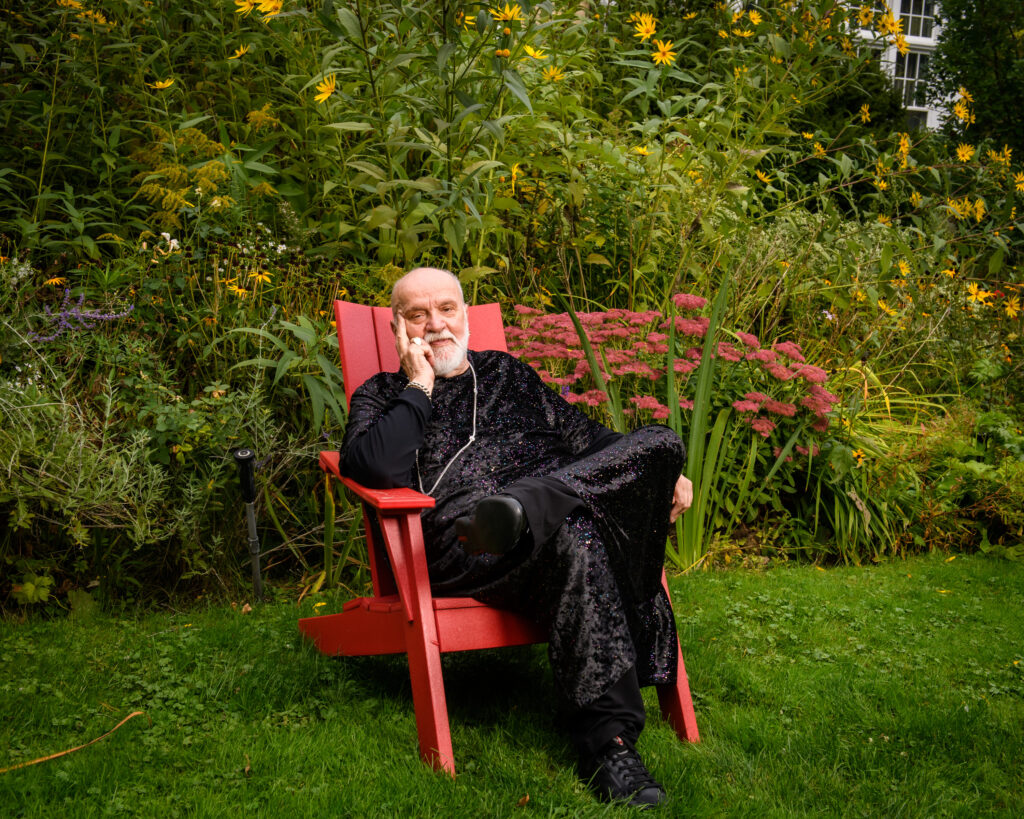A journey through the stars: Salah Bachir’s memoir of fame and friendship
Author, entrepreneur, philanthropist, LGBTQ+ activist, and art collector Salah Bachir has expanded his impressive repertoire this autumn by venturing into the world of writing. Photos: George Pimentel
Bachir’s captivating memoir, First to Leave the Party: My Life Among Ordinary People…Who Happen to Be Famous, delves into his life through fascinating encounters with some of Hollywood’s most iconic figures, such as Marlon Brando, Ella Fitzgerald, Muhammad Ali, Doris Day, Elizabeth Taylor, Katharine Hepburn, Sean Connery, and many others. Released on October 17, this book continues to astound readers with remarkable stories, such as Elizabeth Taylor’s impromptu visit to Bachir’s home to explore his collection of antique jewelry, moments shared over a cigarette with Princess Margaret, and the unforgettable family barbecue with Marlon Brando.

Bachir’s memoir presents an unparalleled glimpse into the lives of these celebrities, shedding light on their genuine kindness and humanity, helping readers understand the essence of their fame. Notably, this glossy five-color book, co-authored with the former film critic of the New York Post and New York Daily News, Jami Bernard, pioneers by featuring an author’s pronouns on the cover. Moreover, a portion of the book’s proceeds will be directed towards supporting the LGBTQ+ rights program at Human Rights Watch. Our conversation with Salah after immersing ourselves in his captivating book was not only enjoyable but deeply heartfelt. We encourage everyone to pick up this remarkable work, allowing us to remember the extraordinary individuals he introduces us to, appreciating them not just for their fame, but for the positive impact they had on the world.
Queer Forty: The title of your book, First to Leave the Party: My Life Among Ordinary People…Who Happen to Be Famous, is so fabulous.
Salah Bachir: The title ‘First to Leave the Party’ was based on the many times when I wasn’t first to leave the party. When we stayed around too long, which is when people got drunk and, obnoxious things…happen. The title is about my life with ordinary people who happen to be famous. At the end of the day, no matter how big a celebrity they have ordinary needs that we all have: quiet, privacy, respect. We’re all playing a role and sometimes people want to let their guard down and let you in and give you a shoulder to lean on. So, it ties it all together. In the sense that I wasn’t going to be chasing you around, no matter how famous you are. I wasn’t gonna stay until four o’clock came around, the drugs came out or any of those things. So I respected people who set boundaries and limits. Being the first to leave the party is my way of setting a boundary around things going on.
You’ve been carrying a lot of these stories with you for a long time. What prompted you to decide to put together the book at this time?
SB: Well, I had some health issues. I had a kidney transplant, I got sepsis and I wasn’t sure if I was going to make it a couple of times. I wanted to remember these people for what they did with their life, how they empowered people, how they helped people, and what they did with their celebrity status. They were often dismissed later in life by their weight, age, or for having a stroke or health issues. In a sense I wanted to put that down and bring them more to life. I wanted to tell the snippet of their story, whether it’s Patricia Neal holding on to me for dear life as we’re walking together and thinking. ‘Well this is really lovely and gray.’ But it’s so much more. The book is mostly a loving tribute to them, to my life, family and friends. Some are here and some we’ve lost.
I was quite moved by how you mentioned your family in the book. You mentioned your mom would cook for Ella Fitzgerald when she was in town and how you had Brando over for barbecue. Sometimes I feel like as if when we move into adulthood in general, there’s a disconnect that happens between children and their parents. And I’m impressed by how you seem to bring your family along.
SB: I saw a lot of friends’ families who were rejected. We always had a family Christmas, and we always had “people with nowhere to go Christmas”. Often, I would go to my family’s Christmas during the day and my mom would pack things for me to take to my other Christmas dinner. I would be like, “Mom, these are all gay people, they’re going to have tons of food. Don’t worry about it.”
My parents left what was going on in the Middle East. Right now our family has Christians, Muslims, Jews, and a couple of atheists. So we were all open to everything that was going on. My parents left a great life to come to Canada for us so we wouldn’t have to go through what’s going on especially if you are queer in that situation, whether you’re in Gaza, Israel, or anywhere else.
It was important to include them in my journey. They changed a lot. I could explain to them what it means to be gay, what my fears were. But they know! Some people just don’t want to admit that their kids are gay, but it was the easiest coming up for me because both my parents admitted they knew. It was an easier transition than anything else I had expected.
Like you, they seem comfortable around famous people.
SB: Well, I mean part of it, I had uncles and cousins who were cabinet ministers and my uncle was ambassador to the UN, but they didn’t know quite a few of these celebrities. My mom didn’t really know who Marlon Brando was. It wasn’t like he was a Lebanese singer or something like that. But Kim Cattrall, she knew (laughs). When we were having dinner, I said, “Mom, Salman Rushdie is coming.”
“Oh, that’s nice.”
But when it was Kim Cattrall, Samantha, it was different. Then she wanted to meet Kim Cattrall. I was a real celebrity to my parents. With everything they went through, with everything that happened, my dad said he always feared he didn’t provide enough for his kids even though he was a contractor in the Middle East. He became an electrical welder when he moved here and worked part time, so there was never a thought that they were more important than anybody else or reason to fawn over anyone. As most of us know, [celebrities are] a lot of work, and not just because of them but everyone around them doesn’t give them privacy, let them go out to lunch, or do something on their own.
In the book, you recount memories with Bette Davis, Marlon Brando and Elizabeth Taylor. I mean, it’s unreal. Is there someone in particular in the book that really just holds a special place for you?
SB: That’s a hard one. I mean, there’s a few of them that were lovers, I guess. We were talking about Keith Haring the other day here, and, if he were still alive he would have been sixty-five. My husband’s an artist and we had a bunch of artist friends over. Somebody asked me what question would you have asked Keith, if he was still alive, and you start to wonder what somebody who died young would have done. Where would they be? Where would their headspace be? I mean, I had Ella Fitzgerald treating me almost like a son. Or remembering Doris Day and what she did with Rock Hudson. Back then people weren’t touching people with AIDS. People were afraid of AIDS, it was 1985. She hugged him and said on the Christian Broadcast Network that if there is a heaven, then Rock Hudson’s in heaven. We think these are revolutionary but then again, it’s just friends and people are people. It’s nothing more than people being compassionate and loving.
Can we talk about Elizabeth Taylor? I was blown away by the chapter where you share that she came over to your place to try on jewelry.
SB: Sorry, I didn’t put this on for you. (Salah pulls out a necklace)
Ah! Beautiful! What are you wearing?
SB: I helped design this. It’s three strands of Tiffany diamonds. It turned into my everyday necklace.
Thank you for showing me. Getting back to Elizabeth Taylor. I got the sense that you were unsure she would actually come over. What was it like when she showed up?
SB: I tend to say a lot of things to people, like if somebody would like to come over, travel to Lebanon, come to see New York my way, that kind of thing. She was filming in Toronto at the time and we had different interactions. When anyone comes over you’re a little nervous. Will someone want a cappuccino, or a coffee? What’s clean, and what’s not clean? Should I have flowers or not? She has a disarming way of making you feel comfortable around her. She’s not Elizabeth Taylor, per se. There’s an old line in the industry where Jayne Mansfield is in the pool with a photographer for an interview and she said, “It’s time for mommy to become Jayne Mansfield.” You could talk about art or politics with Elizabeth. The chapter also mentions how much pain she was in a lot of the time. There’s a lot that people don’t give her credit for. Later on, people just concentrated on how fat she became or how many husbands she had. I think of her often and actually in different ways. We see pictures of her and she was as beautiful with or without makeup on.

And I understand you brought Brando to a gay bear cafe?
(We both laugh)
SB: He was up for everything. I mean, I introduced him to people as my cousin George. He was up for any conversation. He was in town and didn’t know a lot of people. He didn’t want to be a celebrity. He wanted to see things. (Laughs) Looking back on it now, and rethinking, I wonder should I have been more nervous? Should I have cleaned my car a bit more? Should I have done things differently? But for me it would have been a different experience, I wouldn’t have treated them like a friend taking them somewhere. And Brando was bisexual. He had a few male affairs, nothing was off the table. You could speak to him about anything honestly…but I’m not going to go there. But he was still as handsome, well, as hot as any of the earlier photos.
You really tie it all together at the end of your chapter on Brando by sharing how you reached out years later and he asked why you didn’t stay in touch. I think that reinforces an overall theme that comes through in your book. You humanize these celebrities.
SB: Well, I have to think, what would he want with me? We had some time together and we saw each other in LA a few times after that. But it was the same with Douglas Fairbanks Jr., who was really like Hollywood royalty. We included some letters at the end of the book and just to show this, even people who rejected an invitation took the time to write a letter. They bothered to have a letter dictated or write it themselves. Jessica Tandy did it by hand. Katharine Hepburn, I can see her writing that letter using that Underwood typewriter I saw at her place. People took time to do this, it wasn’t just their publicist doing this for them. I asked Diahann Carroll if she wanted hair and makeup. She opened up her whole closet and said, “Which wig do you think I should wear? I’ll do my own hair and makeup.” It was a simpler time. I invited Margaret Atwood to the book launch, which is a charity benefit at one of the oldest gay and lesbian community centers. She was like “Of course, I’ll come, what can I help with, what can I do?” There are quite a lot of people like that in the world.
I was so moved by your chapter on Edward Albee. You write, “What stays in my mind is how someone who was three years younger than my father would want to cuddle with me, or put his head in my lap and talk about family and the sins of our fathers, and the sins of our mothers as well. Sometimes I’d stroke his hair and kiss his forehead, and say, Let it go. Can we? Should we?” I get the sense that you two healed each other at that moment.
SB: He had this beautiful spot in Montauk right on the ocean, and it was all about getting away from New York and everything. There was a difference in age and he was incredibly successful. I revered him. How do you make love to someone you revere? I suddenly become the dad in a scene. It’s like, you don’t expect that with our age difference. He had a great relationship with Jonathan [Richard Thomas] and credited Jonathan with everything. So you know, being in a world where you saw the whole thing as just a moment in time. Several moments in time — you keep it with you. Sometimes you remember a terrible word or terrible words someone said to you years ago, sometimes you remember how someone touched you on the cheek and how vulnerable that made you feel. That’s a hard one for me to talk about. He was a brilliant man. Keeping up in conversation with him was just like a fantasy.
There are profound statements in his plays.
SB: I think about Delicate Balance in relation to COVID. If something happened, people showed up at your door and said, ‘We’re afraid of where we are.’ All his plays still resonate so much with me.

Now that the book has officially hit the shelves, are there any stories that you wish you would have included?
SB: Well, we go to the end of the book, and I wrote it with a friend, Jami Bernard, and we’ve known each other for like forty years. I started writing it a bit glossy and there could have been a lot more about certain people like Eartha Kitt or Aretha Franklin. I could write a whole book on Ella Fitzgerald. We got to a certain point and we didn’t go back because we already had so many pages, so some of them are longer, some of them are shorter, but I think the essence of it is there. It’s not so much about different stars and different people. It’s so much about the message they sent and the message of helping, empowering, and being there for somebody, whether it was Brando or whether it’s my grade five teacher. It’s about people who support you. I’m an Arab, gay, a little bit more flamboyant than most people, and a little heavier. You don’t know where you’re supposed to fit in. We’re not Country Club type people.
Something that resonated with me is the chapter about Tallulah Bankhead. While you never met her, you speak of how important it is to share her story, that she’s someone we can’t forget.
SB: I actually fought with my publishers to include this chapter in the book. I also hadn’t met Harvey Milk and I think that’s one of the strongest chapters in the book. I wanted to look her up more as I’ve been used to all these drag queens from like the past thirty to forty years. I wondered if she actually say any of those things? And then the only place I could find anything was the Hitchcock movie Lifeboat, on I Love Lucy and on Johnny Carson. Lucille Ball was way ahead of her time in so many things and to give her a platform on national television with all this talk and gossip about her was brilliant.
What are your hopes for 2024?
SB: Well, the world right now is in an incredibly terrible situation. We need to sit down and talk to people. We need to get people together again. There are a lot of bullies and a lot of hatred. We need to find a way to talk to each other more to settle things. There’s got to be more room at the table for different people and solutions. You can only hope. But you can also work on it. I have a friend who’s ninety-one who’s showing up to a demonstration at one o’clock tomorrow at a peace march in Toronto. I think having that hope that one day things can be better is always a great thing.
First to Leave the Party: My Life with Ordinary People… Who Happen to Be Famous is out now from Signal/Penguin Random House Canada. The Audiobook was narrated by Ann-Marie MacDonald.






